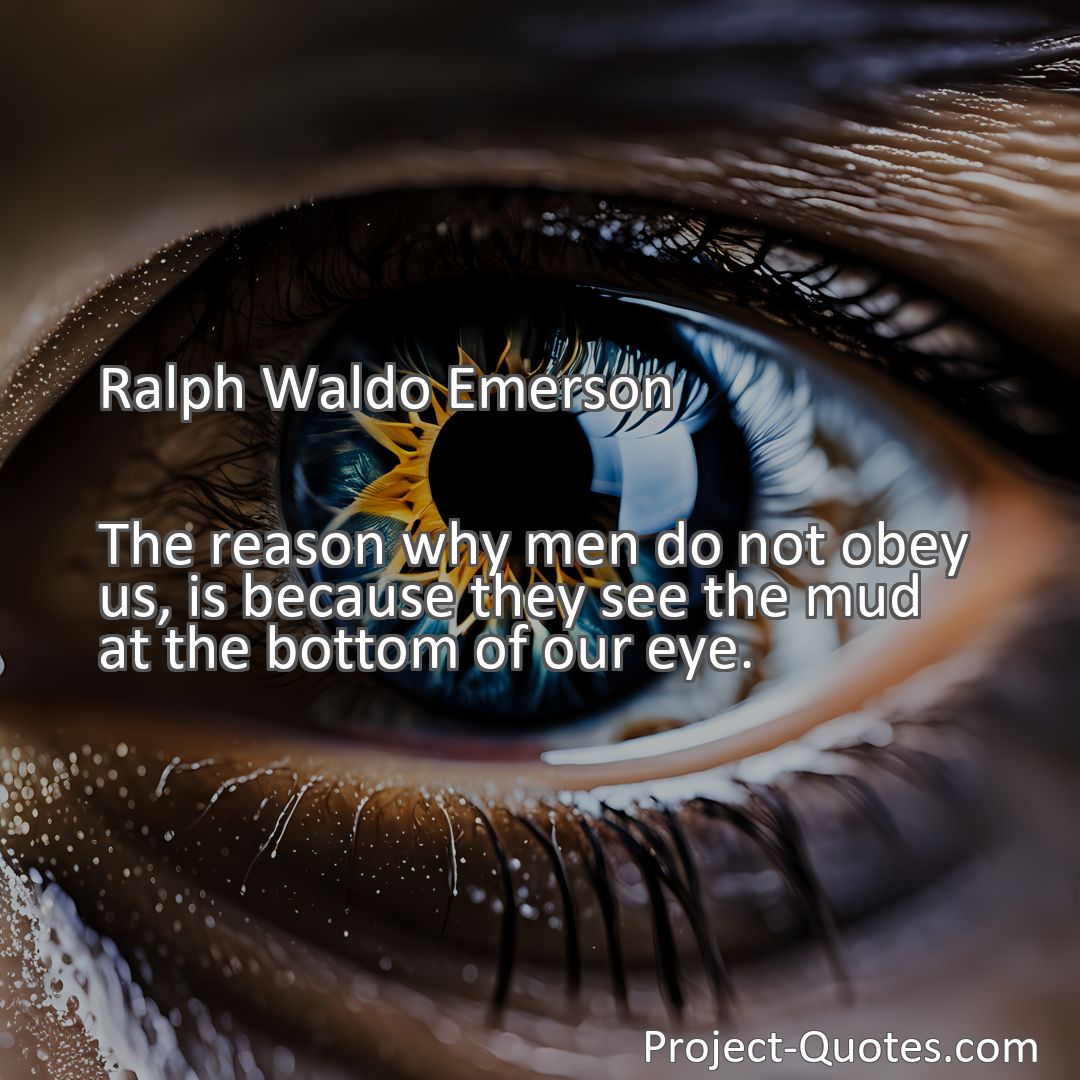The reason why men do not obey us, is because they see the mud at the bottom of our eye.
Ralph Waldo Emerson
by example, inspiring others through our actions rather than just words. Trust is built through self-reflection, personal growth, and authenticity, as it allows others to see past our flaws and connect with us on a deeper level. By embracing these qualities and striving for personal improvement, leaders can create effective and influential relationships that foster respect and cooperation.
Table of Contents
Meaning of Quote – The reason why men do not obey us, is because they see the mud at the bottom of our eye.
Seeing Beyond Appearances: Understanding the True Nature of Perception
Introduction :
In his timeless wisdom, Ralph Waldo Emerson once remarked, “The reason why men do not obey us, is because they see the mud at the bottom of our eye.” By delving into this profound statement, we can unravel the deeper meaning it holds and explore the significance it bears in our relationships and interactions with others. Emerson suggests that the key to understanding why people may not always follow our lead lies in the ability to recognize the flaws within ourselves and work towards personal growth. This essay aims to delve into this concept and shed light on its implications.
Understanding Perception :
Before dissecting Emerson’s quote, it is essential to comprehend the nature of perception itself. Perception refers to the way in which we interpret and make sense of the world around us. It is influenced by numerous factors, including personal biases, experiences, and cultural backgrounds. Our perceptions guide our thoughts, behaviors, and interactions, shaping our understanding of others and how we are viewed by them.
Emerson’s Insight :
According to Emerson, when others choose not to obey us, it stems from their ability to discern the flaws or imperfections within us. It implies that our behavior and actions reflect our true character, often revealing vulnerabilities or shortcomings that may hinder our influence over others. This recognition of “mud at the bottom of our eye” signifies an individual’s intuitive perception of the authenticity of one’s motives, values, and actions, thus influencing their willingness to comply with our requests or follow our lead.
Self-Reflection and Personal Growth :
Emerson’s quote underscores the importance of self-reflection and personal growth as essential practices for building influential relationships. By examining the inner “mud” or flaws within ourselves, we gain valuable insights into our actions, feelings, and intentions. Self-reflection allows us to identify areas for improvement to become more authentic and trustworthy individuals. Additionally, embracing personal growth fosters a sense of humility that enables us to acknowledge our own imperfections and learn from them.
Developing Trust and Authenticity :
Trust is a fundamental building block for any successful relationship or leadership role. Without trust, it becomes challenging to inspire others or gain their cooperation. Emerson’s quote emphasizes that trust is not solely reliant on external factors, such as charisma or persuasion skills. Instead, trust is something that radiates from within, drawing from our ability to live authentically and transparently, without hiding the “mud” in our eyes.
To cultivate trust, we must first acknowledge our vulnerabilities and inadequacies. By striving to understand ourselves better, we can approach others with humility, empathy, and genuine intentions. This deep self-awareness allows us to connect with others on a more meaningful level, fostering relationships built on trust and mutual respect.
Leading by Example :
Effective leadership requires leading by example, inspiring others through our actions rather than just words. Emerson’s quote suggests that people perceive the truth about us beyond mere appearances and are drawn to authenticity. When we lead by example, we demonstrate integrity, consistency, and a genuine care for the well-being of others. These qualities inspire trust and motivate others to follow our lead willingly.
Conclusion :
In the words of Ralph Waldo Emerson, our ability to influence others hinges on our capacity to recognize and address the flaws within ourselves. Understanding the concept of perception and the impact it has on our relationships allows us to navigate them more effectively. By aiming for personal growth, developing trust, and leading by example, we can overcome the “mud” in our eyes and embody the qualities that evoke respect, cooperation, and obedience. Ultimately, the recognition and acknowledgment of our imperfections lead to profound personal growth and stronger, more harmonious interpersonal connections.
I hope this quote inspired image brings you hope and peace. Share it with someone who needs it today!


